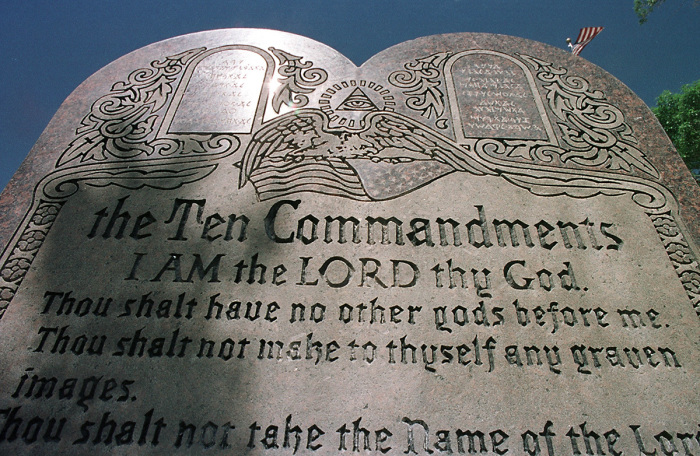
A newly-passed Texas law that requires the Ten Commandments to be displayed in public school classrooms is facing a second interfaith legal challenge.
A lawsuit filed by a coalition of 16 families spanning Jewish, Christian, Unitarian Universalist, Hindu and nonreligious backgrounds argues that Senate Bill 10 violates the First Amendment’s guarantees of church-state separation and the free exercise of religion. The case was filed in the U.S. District Court for the Western District of Texas, with legal support from the ACLU of Texas, the ACLU, Americans United for Separation of Church and State, and the Wisconsin-based atheist group Freedom From Religion Foundation.
Signed into law last month, SB 10 requires schools to post the Ten Commandments, measuring at least 16-by-20 inches in a legible typeface, in a “conspicuous place” in every classroom.

Subscribe to get daily/weekly email with the top stories (plus special offers!) from The Christian Post. Be the first to know.
According to the complaint, the mandated text favors a Protestant tradition, with commandments including “I AM the LORD thy God,” “Thou shalt have no other gods before me,” and “Thou shalt not make to thyself any graven images.” The suit’s plaintiffs say this specific version conflicts with the beliefs of many, including Jews and Catholics, whose versions of the Ten Commandments differ in translation, numbering, or emphasis.
For instance, the Jewish version highlights God’s role in liberating the Israelites from Egypt and uses “murder” instead of “kill,” while the Catholic version omits the prohibition on “graven images,” aligning with their use of religious iconography.
The lawsuit highlights Texas’ diverse student population of over 5.5 million across 9,000 public schools, many of whom “adhere to an array of faiths, and many do not practice any religion at all.” According to the plaintiffs, SB 10 disregards this diversity and the nation’s founding principles, as the Declaration of Independence, U.S. Constitution, and Bill of Rights were not based on the Ten Commandments, nor is there a tradition of displaying them in classrooms.
“As a rabbi and public-school parent, I am deeply concerned that SB 10 will impose another faith’s scripture on students for nearly every hour of the school day,” said plaintiff Rabbi Mara Nathan in a statement from the ACLU. “While our Jewish faith treats the Ten Commandments as sacred, the version mandated under this law does not match the text followed by our family, and the school displays will conflict with the religious beliefs and values we seek to instill in our child.”
Pastor Griff Martin of the progressive First Baptist Church of Austin called SB 10 “un-American and un-Baptist” and linked the push to display the Ten Commandments with Christian nationalism. “SB 10 undermines the separation of church and state as a bedrock principle of my family’s Baptist heritage. Baptists have long held that the government has no role in religion — so that our faith may remain free and authentic. My children’s faith should be shaped by family and our religious community, not by a Christian nationalist movement that confuses God with power.”
For Hindu plaintiff and Texas Children’s anesthesiologist Arvind Chandrakantan, the law feels like an attack on his faith. “S.B. 10 imposes a specific, rules-based set of norms that is at odds with my Hindu faith. Displaying the Ten Commandments in my children's classrooms sends the message that certain aspects of Hinduism — like believing in multiple paths to God (pluralism) or venerating (statues) as the living, breathing, physical representations of God — are wrong,” he said in a statement.
Attorneys for those opposed to the Ten Commandments displays in public schools pointed to comments made by lawmakers during legislative hearings earlier this year, including Sen. Donna Campbell, who cited Joshua 1:9 in her defense of SB 10.
“Don’t be afraid. Don’t be discouraged, because the Lord, thy God is with us throughout our life. There is an afterlife. There is eternal life. And if we don’t expose, or introduce is a better word, our children and others to that, when they die, they had one birth, two deaths, because they will know nothing about the afterlife, the eternity with God," Campbell said. "But exposing them or introducing them to Ten Commandments [and] prayer, it asks other questions, and they then have a choice in their future. Two births, and one death. And this is what we’re doing. Prayer gives us our faith. The Ten Commandments, while they are laws, actually expand our freedoms. That’s what we’re about.”
The lawsuit also cited comments from another SB 10 sponsor, Sen. Tan Parker, who, in reacting to testimony in favor of the bill, expressed alarm that only 25% of students have attended church. “I’m in shock ... that only twenty-five percent of our kids today in schools have been in a church,” he said. “That should make everybody listening absolutely scared to death. I mean, obviously, only the Lord can save us, and we need to engage in prayer. But to realize only twenty-five percent of our kids in schools today have been in a church is absolutely horrific and something we all need to work on to address.”
Last month, a Dallas activist group known for its advocacy on behalf of accused murderer Karmelo Anthony was joined by a number of faith leaders in a lawsuit which claims SB 10 "unconstitutionally pressures students into religious observance, reverence, and adoption of the state's mandated religious scripture."
News Source : https://www.christianpost.com/news/christians-join-jewish-hindu-plaintiffs-in-10-commandments-suit.html
 Your post is being uploaded. Please don't close or refresh the page.
Your post is being uploaded. Please don't close or refresh the page.





